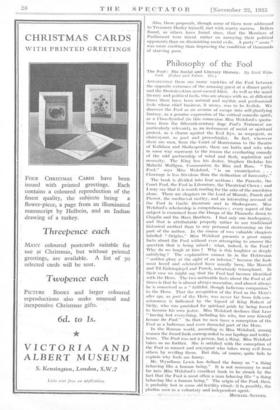Philosophy of the Fool
The Fool : His Social and Literary History. By Enid Weis- ford. (Faber and Faber. 2 Is.) APPARENTLY there are many varieties of the Fool betWeen the opposite extremes of the amusing guest at a dinner party and the Dostoievskian semi-sacred Idiot. As well as the usual literary and political fools, who arc always with us, at different times there have been natural and mythic and professional fools whOse chief business, it seems, was to be foolish. We discover the Fool as an avenue of escape into self-glorifying fantasy, as a genuine expression of the critical comedic spirit; as a Class-Symbol (in this connexion Miss Welsford's quota, lions from the fifteenth-century Sage Fool's Testament are particularly relevant), as an instrument of social or spiritual protest, as a charm against the Evil Eye, as scapegoat, as clairvoyant, as poet. and proverbialist. In fact, wherever there are men, 'front the Court of Montezuma to the theatre of Kalidasa and Shakespeare, there are butts and wits who in some way represent to the reason the- everlasting comedy of the odd partnership of mind and flesh, aspiration and necessity. The 'King has his Jester, Stephen Dedalus his Malachi Mulligan, Communism its Bim and Bom. " The Fool," says Miss Welsford, " is an emancipator.. . . Clownage is less frivolous than the deification of humanity."
The book is divided into four' sections : the Parasite, the Court Fool, the Fool in Literature, the Theatrical Clown ; and I may say that it is worth reading for the sake of the anecdotes alone. There are chapters on the Lord of Misrule, Punch and Pierrot, the mediaeval motley, and an interesting account• of the Fool in Gaelic literature and in Shakespeare, Miss Welsford's scholarship is comprehensive ; every aspect of the subject is examined from the Danga of the Pharaohs down to Chaplin and the Marx Brothers. I find only one inadequacy, and that is attributable properly rather to our traditional historical method than to any personal shortcoming on the part of the author. In the course of two valuable chapters labelled t` Origins," Miss Welsford presents a great many facts about the Fool without ever attempting to answer the question that is being raised : what, indeed, is the Fool ? Why do we laugh at him y Why is this laughter so deeply satisfying ? The explanation cannot lie in the Hobbesian " sudden glory at the sight of an inferior," because the fools most loved and celebrated have usually been, like Marcoll and Til. Eulenspiegel and Punch, notoriously triumphant. In their case we might say that the Fool had become identified with the Hero. The two noticeable facts about the Fool at all times is that he is almost always masculine, and almost always he is conceived as a " faithful, though ludicrous companion " to the Hero. That the recognition of the Fool as the Hero's alter ego, as part of the Hero, was never far from folk-con- sciousness is. indicated by the legend of King Robert of Sicily, who was punished for spiritUal pride by being forced to become his own jester. Miss Welsford declares that Lear
having lost everything, including his wits, has now himself become the Fool." So that we now have a conception of the Fool as a ludicrous and even shameful part of the Hero.
In the Roman world, according to Miss Welsford, among women the dwarf-fools corresponded to our lapdogs and teddy- bears. The Fool was not a person, but a thing. Miss Welsford takes us no further. She is satisfied with the conception of the Fool as mascot and scapegoat who takes away evil from others by reviling them. But this,' of Course, quite fails to explain why fools are funny.
Mr. Wyndham Lewis has defined the funny as " a thing behaving like a human being." It is not necessary to read far into Miss Welsford's excellent book to be struck by the fact that the Fool is, most often a man behaving like "a thing behaving like a human being." The origin of the Fool, then, is probably lost in some old fertility ritual : it is, possibly, the phallus seen as a voluntary and independent agent.






























































































 Previous page
Previous page